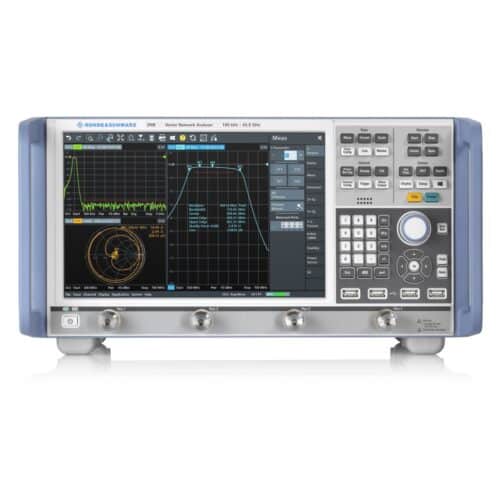Rohde & Schwarz adds new models and options to the R&S ZNB vector network analyzer family, addressing applications in the mmWave range such as 5G at FR2 frequencies and applications in aerospace and defense in the Ka band. The R&S ZNB26 provides network analysis up to 26.5 GHz, and R&S ZNB43 extends the upper frequency of the midrange VNA family to 43.5 GHz. The R&S ZNB vector network analyzer is now available with a maximum frequency of 43.5 GHz. The R&S ZNB has already proved to be a reliable partner for both development and production network analysis applications. With features such as ease of operation and a measurement performance which combines outstanding speed and dynamic range with temperature stability, it is a leading instrument in the midrange class.
The R&S ZNB26 extended the maximum frequency to 26.5 GHz, now the R&S ZNB43 adds a frequency range of 100 kHz to 43.5 GHz. Rohde & Schwarz will launch this latest model at the IMS2022 (International Microwave Symposium) held in Denver, CO, USA from June 19 to 24, 2022. The R&S ZNB43 is available as 2 port or 4 port models, with two connector types, either 2.4 mm or 2.92 mm. It also offers optionally an extended power range and a second internal source. The R&S ZNB43 is very suitable for characterization of passive devices such as filters, couplers, and switches. When equipped with the second internal source, it becomes a versatile instrument for measurements of active devices such as mixers and amplifiers. Higher frequencies, faster clock rates, and more precise specifications all demand more accurate device characterization. In particular for the higher microwave frequencies, de-embedding the test fixture from the device under test is increasingly important. While simple in principle, de-embedding is much more complicated in practice, as the S-parameters for the fixture cannot easily be measured. Only in the past few years have practical de-embedding solutions come to the market. For many Rohde & Schwarz network analyzers including the R&S ZNB family, a range of industry-wide well accepted software tools for deembedding in line with IEEE 370 are now available as fully integrated options.

With any network analyzer, no matter how well a test setup has been calibrated, there will still be a residual measurement uncertainty which will vary according to settings such as the power level for the current test. Knowing the actual uncertainty under given test conditions is crucial. The R&S ZNB allows users to keep track of measurement uncertainty in real-time, with integrated software options.
The R&S ZNB family also supports inline calibration units which remain connected to the device under test throughout the test period. Inline calibration is essential for tests in a thermal chamber for example on satellites or satellite components. Or in multiport setups with large numbers of ports, where instead of a timeconsuming reconnection of DUT cables, recalibration is reduced to just pressing a button on the R&S ZNB.






